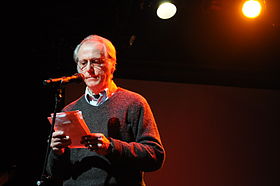Don DeLillo
| Don DeLillo | |
|---|---|

DeLillo in New York City, 2011
|
|
| Born | Donald Richard DeLillo November 20, 1936 New York City, United States |
| Occupation | Novelist |
| Nationality | American |
| Literary movement | Postmodernism |
| Notable works |
White Noise, Libra, Mao II, Underworld, Cosmopolis |
Donald Richard "Don" DeLillo (born November 20, 1936) is an American novelist, playwright and essayist. His works have covered subjects as diverse as television, nuclear war, sports, the complexities of language, performance art, the Cold War, mathematics, the advent of the digital age, politics, economics, and global terrorism.
Initially a well-regarded cult writer, the publication in 1985 of White Noise brought him widespread recognition. It was followed in 1988 by Libra, a bestseller. DeLillo has twice been a Pulitzer Prize for Fiction finalist (for Mao II in 1992 and for Underworld in 1998), won the PEN/Faulkner Award for Mao II in 1992 (receiving a further PEN/Faulkner Award nomination for The Angel Esmeralda in 2012), was granted the PEN/Saul Bellow Award for Achievement in American Fiction in 2010, and won the Library of Congress Prize for American Fiction in 2013.
DeLillo has described his fiction as being concerned with "living in dangerous times", and in a 2005 interview declared, "Writers must oppose systems. It's important to write against power, corporations, the state, and the whole system of consumption and of debilitating entertainments [...] I think writers, by nature, must oppose things, oppose whatever power tries to impose on us."
DeLillo was born on November 20, 1936 and grew up in a working-class Italian Catholic family, from Molise, in an Italian-American neighborhood of the Bronx in New York City, not far from Arthur Avenue. Reflecting on his childhood in The Bronx, DeLillo later described how he was "...always out in the street. As a little boy I whiled away most of my time pretending to be a baseball announcer on the radio. I could think up games for hours at a time. There were eleven of us in a small house, but the close quarters were never a problem. I didn't know things any other way. We always spoke English and Italian all mixed up together. My grandmother, who lived in America for fifty years, never learned English."
...
Wikipedia
